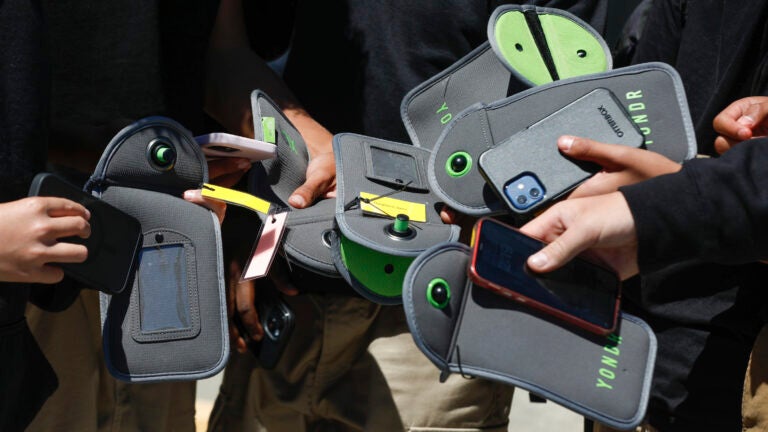Education
Senate President Karen Spilka said she hopes to get legislation in front of Governor Maura Healey before the start of the school year.

A potential statewide “bell-to-bell” ban on cell phones in schools could get devices out of the classroom by September.
Attorney General Andrea Campbell previously proposed the Safe Technology Use and Distraction-Free Education Youth Act, also known as the STUDY Act in January. The legislation would restrict cell phone use in schools and set safety standards for minors for social media companies.
A statewide ban in Massachusetts could come to schools this fall, Senate President Karen Spilka told the Boston Herald. In an interview last week, Spilka said she hopes her chamber can work to get a proposed ban on Governor Maura Healey’s desk before September. Spilka or House Speaker Ron Mariano did not return a request for comment about the plan.
Bans on cell phones in classrooms have increasingly gained traction, with advocates and legislators arguing that the devices restrict learning, distract students, and affect their mental health during a recent legislative hearing. At least 25 states and Washington D.C. have laws requiring school districts to ban or restrict cell phone use in classrooms, according to EducationWeek.
“I think we as adults need to take some action to help them deal with breaking free from some of that cell phone use,” Spilka told the Herald. “Using it during the school day is a pure distraction. It takes away their attention from school, from their learning, from being present in school.”
Lawmakers hear testimony on STUDY Act
During a Joint Committee on Education hearing June 17, lawmakers heard from students, parents, fellow representatives, and experts on the STUDY Act and similar legislation.
The act would require each public school to “have a policy regarding the use of personal electronic devices on school grounds and during school-sponsored activities to reduce distractions, maintain environments focused on learning and protect the privacy and safety of students and staff,” according to the filed bill language. “The policy shall include, but not be limited to, a prohibition on physical access to a personal electronic device by students during the school day.”
Campbell filed video testimony to support the act, which gives districts the ability to design their own policies to best suit their school, her office said.
“A bell-to-bell phone-free school policy keeps students focused throughout the full school day,” Campbell said. “This includes instructional time, as well as passing periods, lunch, and other noninstruction time, in order to promote not only improved focus in the classroom, but the development of actual in-person social skills.”
A Shrewsbury High School student described his school’s new policy to put cell phones in a “phone holder” at the front of the classroom at the beginning of each period. Students were at first resistant to the change, he said, but it’s been a simple improvement to his classroom environment.
“What’s happening in Shrewsbury and other school districts shouldn’t be an isolated experiment,” the student said. “It should be the beginning of a larger conversation across the state.”
Deb McCarthy, the vice president of the Massachusetts Teachers Association, spoke in support of the STUDY Act.
“When asking educators for their input on a bell-to-bell policy around cell phone use in school, there was a broad consensus that it needs to be a policy, it needs to be consistent, and it cannot be another unfunded mandate,” McCarthy said.
‘I watched the students start talking to each other again’
State Rep. Joshua Tarsky, who was a principal at Holbrook Middle-High School, told lawmakers during the hearing that the “Yondr” pouch program was “transformative.” He spoke to support his own bill, which explicitly mentions the pouch program.
“I watched the students start talking to each other again at lunch, down the hall, discipline and bullying incidents became less frequent,” Tarsky said.
With a grant from the Department of Elementary and Secondary Education, each student was given a Yondr pouch to lock their phone in during the school day. When coming in for the day, students would lock the pouches in front of an administrator at the door, and when leaving, administrators would open the pouches with a magnetic device.
“It was quick. The logistics of this was a lot more streamlined than I think people realize,” he said. “There was a lot of criticisms around this policy,” but “the culture of the school shifts almost instantly.”
Sign up for the Today newsletter
Get everything you need to know to start your day, delivered right to your inbox every morning.

